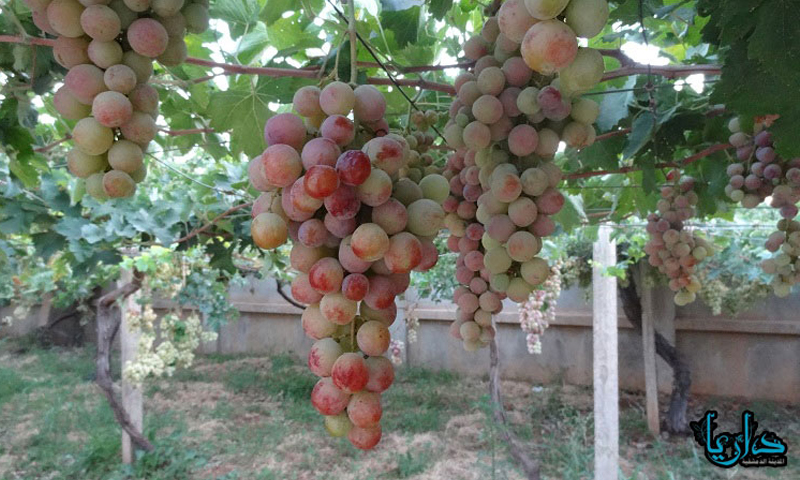



Printed Edition No.: 227
Daraya – Enab Baladi
Maher Abu Mohammad checks on daily what is left of the grapes’ pergola planted in the garden of his destroyed house. He takes care of it despite the damage caused by an explosive barrel, which destroyed his house, and only a few green veins interspersed with shy grapes that remain steadfast in the face of shelling.
Daraya, the city of grapes, mourns its local and decorative grapes, since it no longer hears the echoes of vegetable sellers’ voices in the Damascene markets that have longed called for Darayan grapes and its quality, while a lump remains in the throats of the city’s farmers who, despite the loss, continue to praise their grapes and its different kinds that characterize the source of grapes in the countryside west of Damascus.
Abu Mohammad, a farmer from the city of Daraya, told Enab Baladi that his city and the gardens of its houses used to be formerly covered with Darayan grapes’ pergola, as almost every house had some “since it is the favorite planting for all farmers and their feature”, adding “there used to be a love relation between the farmer and the grape’s tree. The farmer used to take care of it on a daily basis and watch it grow, and this is what distinguished us in this planting.”
The grapes’ planting in the city has declined over the past few years with the urban inflation, the thing that pushed farmers to invest the lands in the area of Deirkhabayah, Khan AlSheeh farms, right down to Quneitra and Horan lands, where they planted vast spaces with grapes in those areas, according to ‘Abu Mohammad’, however, with the beginning of the revolution, the agriculture declined “due to the volatile situation in the region and the grapes’ need for constant care.”
The grapes of the city have the same situation as the agriculture in it, which have completely stopped, since the grapes’ pergolas have been damaged due to the shelling, especially during the recent campaign launched by the regime a month ago, targeting the agricultural lands in order to put the residents of the city under pressure.
The farmer Haitham Abo Abdo says “we have inherited grapes’ planting of our fathers and grandfathers. It has always come first for all farmers, which gave them a great expertise in planting them, since Darayan grapes are the best kind of grapes in Syria”, pointing out in his interview with Enab Baladi that grapes, figs, berries and other fruits have helped the residents a great deal during years of siege since 2012.
Abu Abdo smiles as he continues “grapes have decreased the brunt of siege and its cruelty over us; in addition to eating it, we used to drink its juice during Ramadan and even eat its leaves when we were starving. However, this year, we have been completely deprived of it, after the regime has the control over the areas of grapes’ pergolas, while the rest, located inside the city, have been totally damaged because of the shelling.”
The local council has documented the loss of around 300 acres of agricultural lands in favor of the regime during the recent campaign. The director of the relief office in the council, Haitham Ghazal, told Enab Baladi that the larger part of the grapes’ pergolas have been controlled by Assad’s forces since the beginning of the campaign, while most of them have been harmed due to the farmers inability to reach them, since they are considered a targeted military areas.
According to Ghazal, in recent times the regime has tended to “direct his fire to any green vine in the city”, concluding that “any planted land, trees or anything that indicate life spotted by reconnaissance aircrafts is considered a target for explosive barrels and directed missiles.”
if you think the article contain wrong information or you have additional details Send Correction